Incentives Inspire Positive Behavior Change in Youth on Probation

Offering incentives beats traditional supervision in encouraging positive behavior change among youth on probation, according to a new study funded by the Annie E. Casey Foundation.
The evaluation — conducted by the Center for the Study and Advancement of Justice Effectiveness and the University of Washington Department of Psychiatry and Behavioral Sciences — focused on Opportunity-Based Probation, a program of the Pierce County, Washington, Juvenile Court.
How opportunity-based probation works
Opportunity-based probation aims to help youth build skills, develop responsibility and avoid being arrested again.
Probation staff, young people and their caregivers work together to develop a case plan and define weekly goals. Positive behaviors and met milestones earn participating youth points, which they can redeem for rewards (such as movie theater tickets) or enrichment activities in the community (i.e. a job shadowing opportunity). When youth reach certain benchmarks, they can have fewer supervision meetings and — ultimately — earn early release from probation.
“Probation counselors and parents feel really good about this model,” says Pierce County Juvenile Court Probation Manager Kevin Williams. “It’s the right spirit…and young people really like that they can earn their way off probation.
If youth don’t reach their weekly goals or if they violate the terms of their probation agreement, staff use a grid of options to respond appropriately, including temporarily suspending a young person’s ability to redeem points.
Results by the numbers
The evaluation’s first phase — which spanned an 18-month period from 2017 to 2018 — compared outcomes for youth involved in Opportunity-Based Probation versus traditional supervision. Participants in the incentive-based approach logged 60% fewer new referrals to court and 67% fewer probation violations compared to their traditionally supported peers.
During the study, 53% of all Opportunity-Based Probation participants were young people of color — an indication that incentive-based approaches may be a promising option for helping youth of color succeed on probation.
Why opportunity-based probation works
Pierce County’s Opportunity-Based Probation program is rooted in research that indicates young people respond better to rewards than they do to threats of punishment. The program’s collaborative case-planning approach values youth voices and family connections, and its use of short-term, manageable goals recognizes that youth are still developing a capacity for longer-term forward thinking.
The evaluation’s next phase reviews feedback from youths and families to determine if the program has helped strengthen these important connections.
Read Casey’s report on Transforming Juvenile Probation
Learn about Pierce County’s efforts to build community partnerships






